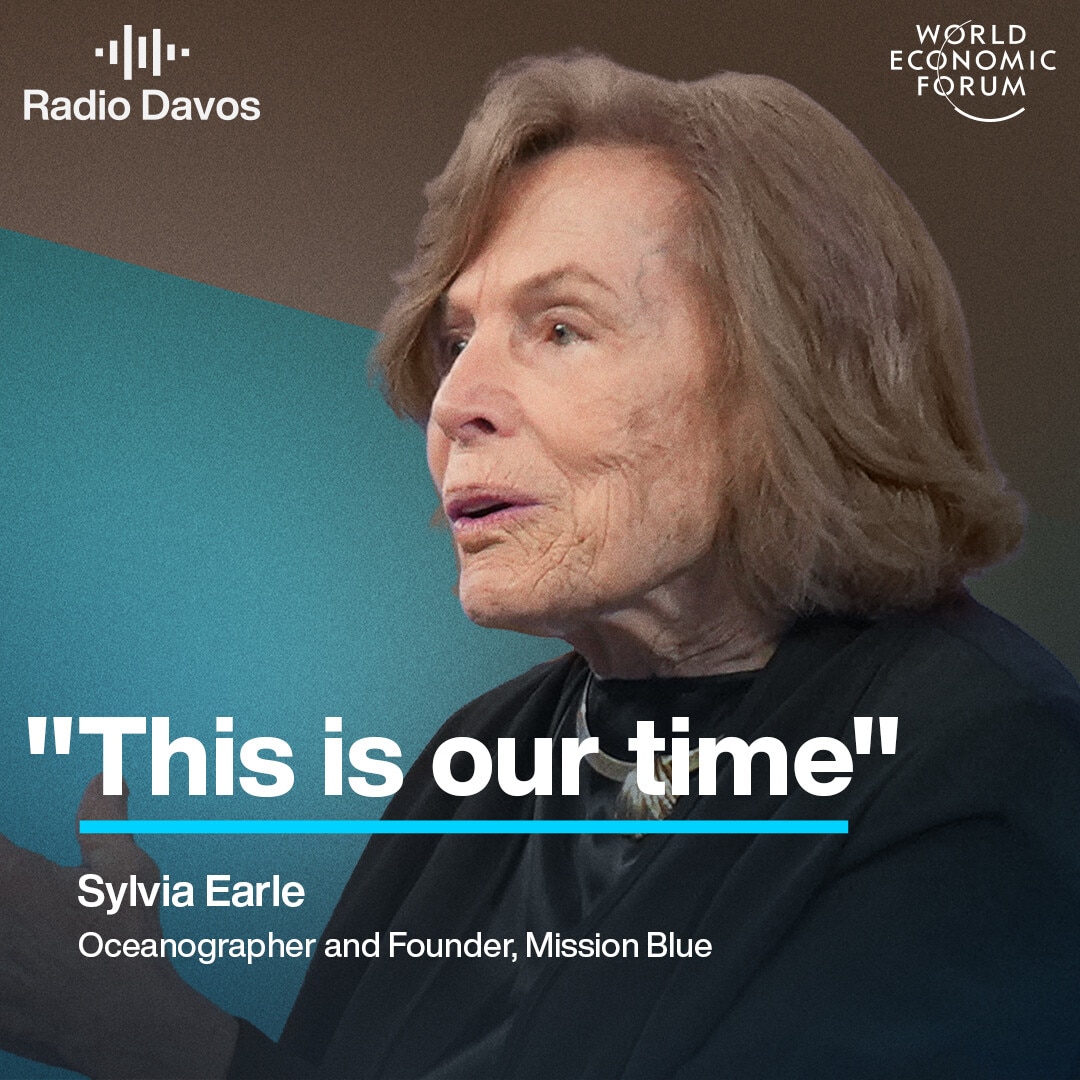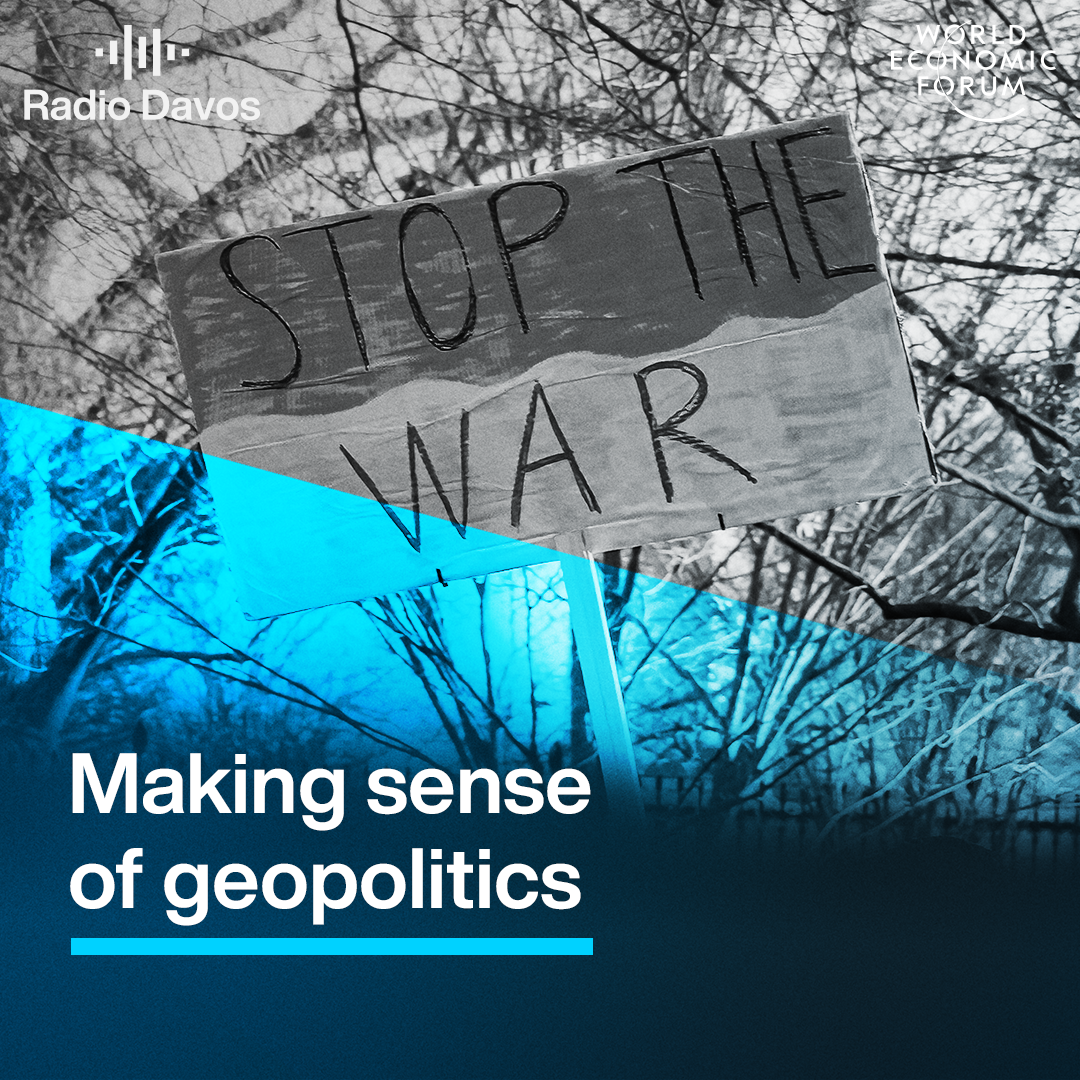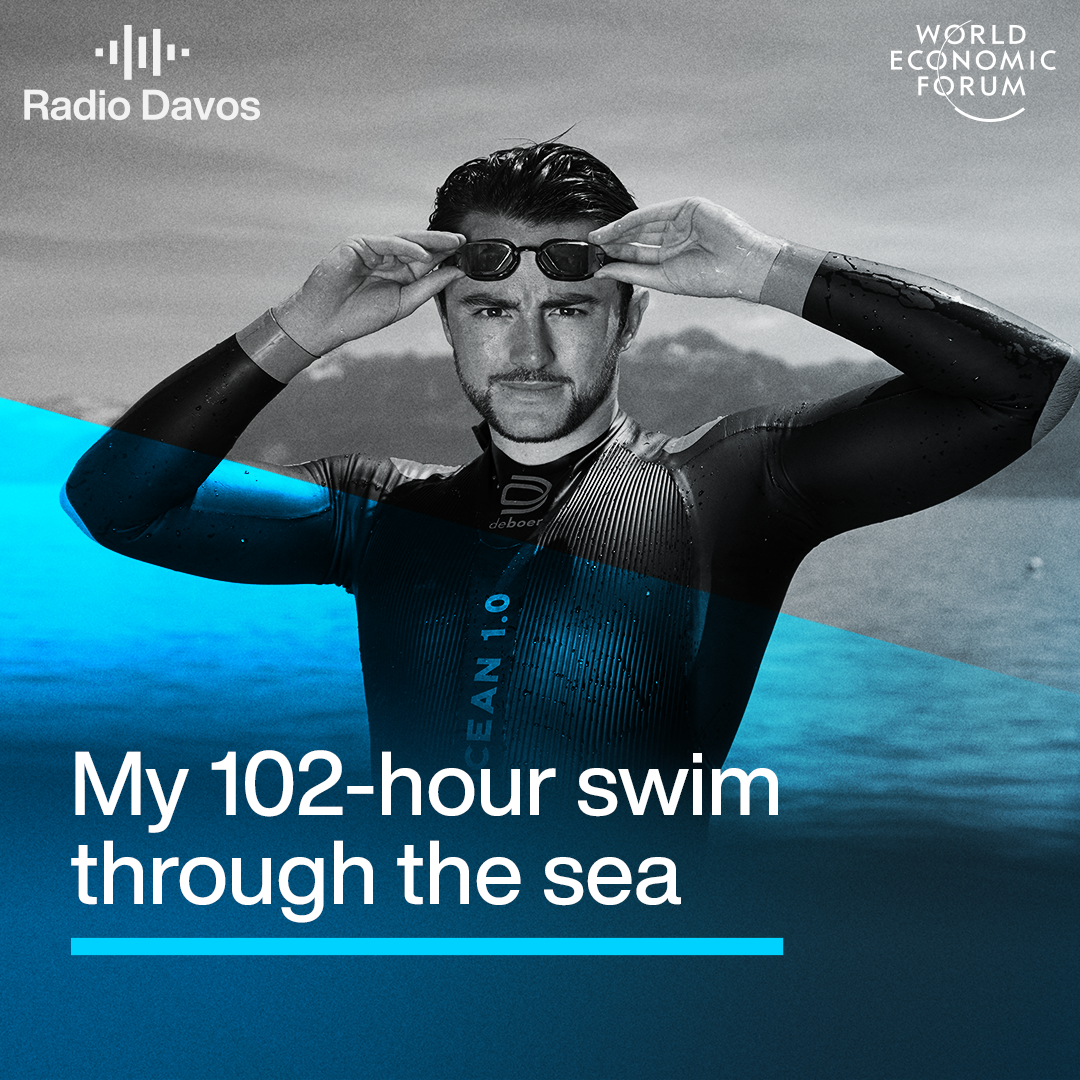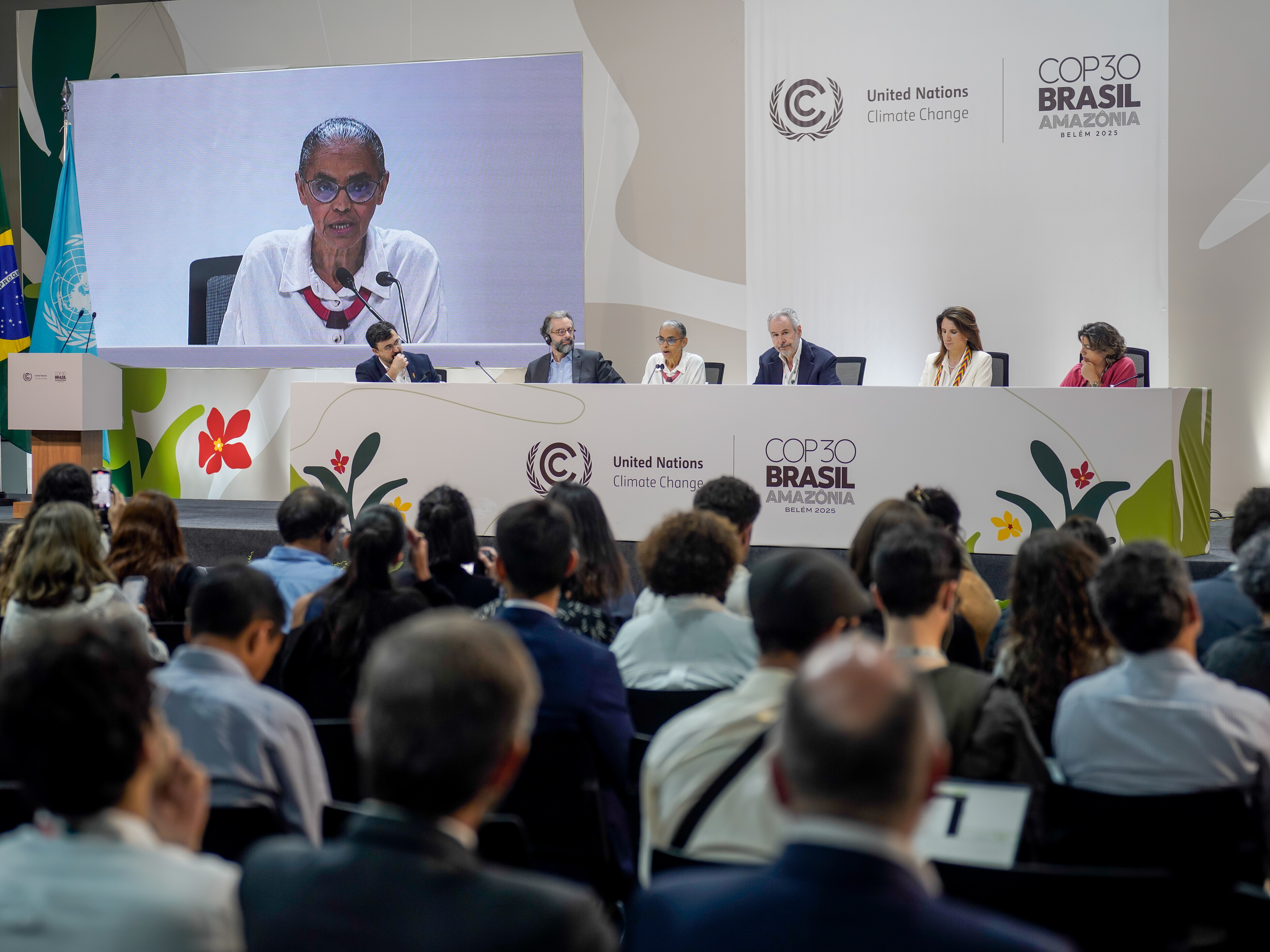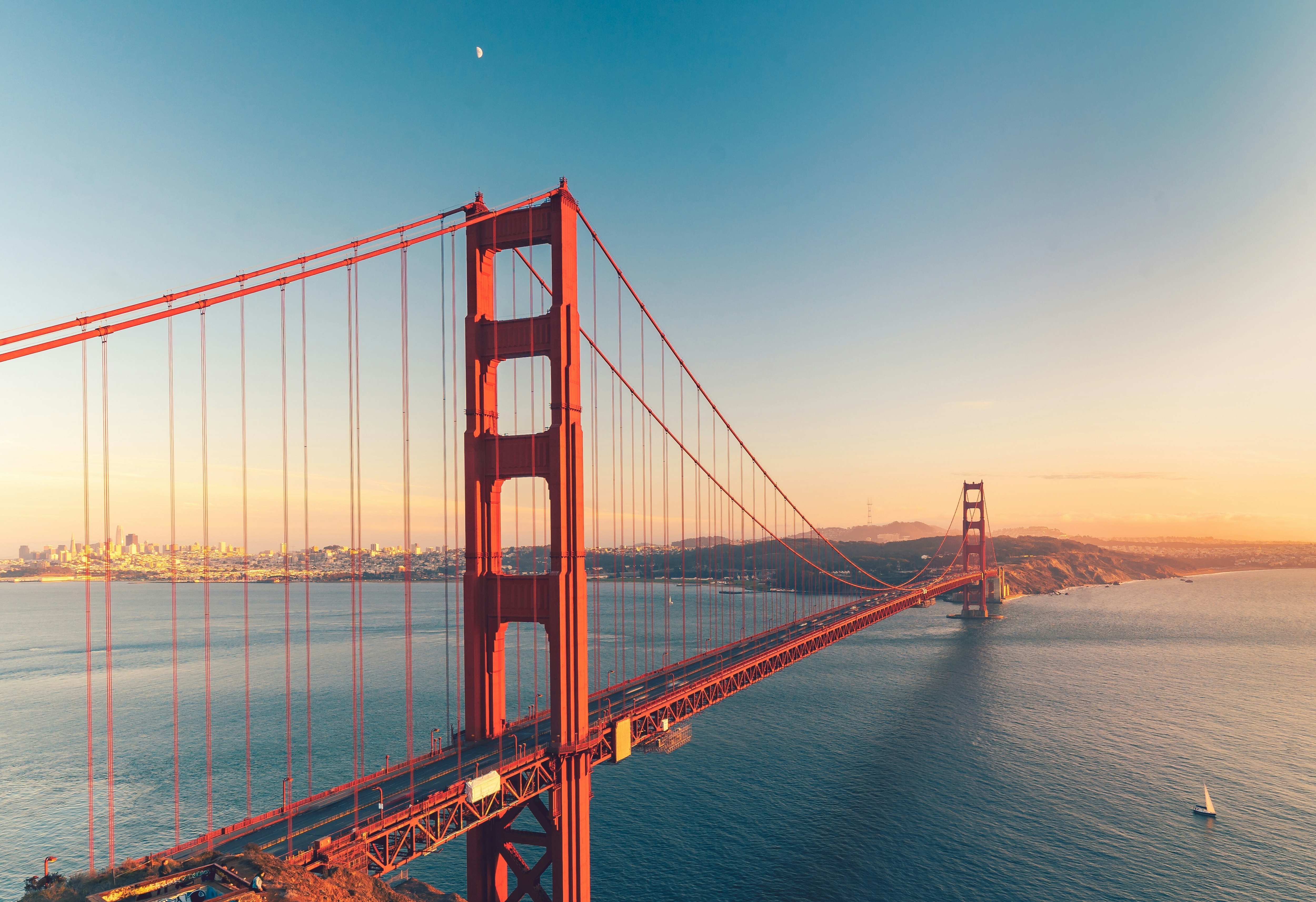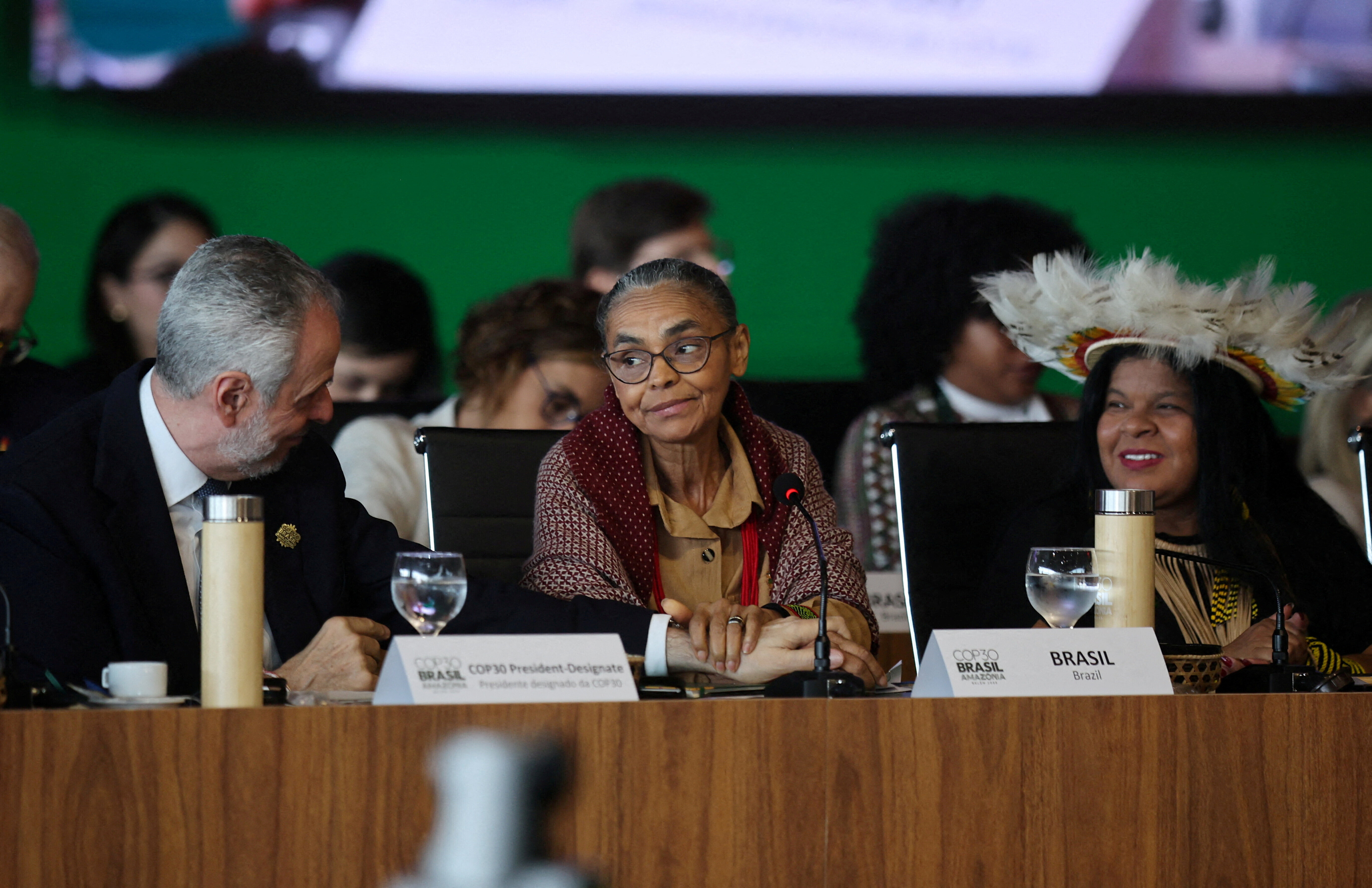How the 'Wild Wet West' was won: why the UN High Seas Treaty is big news
播客文字稿
This transcript has been generated using speech recognition software and may contain errors. Please check its accuracy against the audio.
Kristian Teleki, Director of Ocean Action Agenda and Friends of Ocean Action at the World Economic Forum: Fifty percent of the Earth's surface is in that high seas area, which for the most part has been unmanaged, unregulated for time immemorial, and what we would often refer to as the Wild Wet West.
Robin Pomeroy, host of Radio Davos: The 'Wild Wet West' has been tamed - after decades of talks, the United Nations has just agreed a treaty to protect the high seas.
Kristian Teleki: This global ocean treaty or this high seas treaty will make sure that we can really sustainably manage it
Robin Pomeroy: On this episode of Radio Davos, we hear what’s in the treaty, why it’s so significant, and what it means for a fragmented world to come together for the common good.
Kristian Teleki: The ocean may divide us physically, but it certainly brings people together. There's a long and rich history of multilateralism around the ocean.
Robin Pomeroy: Kristian Teleki, who heads up the World Economic Forum’s work on the ocean, has dedicated a large chunk of his life to getting this type of outcome. We hear what this means to him
Kristian Teleki: Huge. Absolutely huge. I mean an extremely emotional moment for many people. Even now, just when you asked me, I felt goosebumps thinking about what it means.
Robin Pomeroy: And while there are still enormous challenges in protecting the ocean and the planet, Teleki says we should take a moment to enjoy this rare good news story
Kristian Teleki: For once in our lives we're actually handing on a legacy to our children and our grandchildren that we can be really proud of.
Robin Pomeroy: Subscribe to Radio Davos wherever you get your podcasts, or visit wef.ch/podcasts where you will also find Meet the Leader, Agenda Dialogues and the World Economic Forum Book Club Podcast.
I’m Robin Pomeroy, podcasts editor at the World Economic Forum, and with this analysis of the UN High Seas Treaty...
Kristian Teleki : I firmly believe that this is something that the world should be proud. I think we need to celebrate these moments.
Robin Pomeroy: This is Radio Davos.
Rena Lee, chair of the UN ocean talks: Good evening-ish, ladies and gentlemen.
Robin Pomeroy: At UN headquarters in New York Rena Lee, Singapore’s ambassador for the ocean and the chairperson of gruelling talks on protecting it, announces, after 38 hours of negotiations, that the world has finally agreed the first treaty to govern the high seas.
Rena Lee: The ship has reached the shore.
Robin Pomeroy: The ship has reached the shore. For people involved in ocean conservation, the agreement, after decades of talking about it, of a UN high seas treaty is monumental.
To explain to us what was agreed, what it means for the ocean and for all of us who depend on the ocean for food, trade, biodiversity, for things to do with climate. I'm joined by someone who's been working in this field for years, Kristian Teleki, who is the director of Ocean Action Agenda and Friends of Ocean Action at the World Economic Forum. Kristian, thanks for joining us. How are you?
Kristian Teleki: Very good. Glad to be here at this really exciting moment in history.
Robin Pomeroy: Just delighted to have you here. So a lot of people would have seen the headlines probably a few days ago as we record this, of this meeting at the United Nations in New York. They agreed a treaty, the High Seas Treaty. Could you give us an outline of what was agreed?
Kristian Teleki: Sure. Well, maybe I should just start to make sure everyone understands what we talk about in terms of the high seas. Every country around the world has their national waters or their exclusive economic zone, which is out to 200 nautical miles from their shore. The waters that are beyond that, outside of those national areas, are what's called the high seas, and that's about 50% of the Earth's surface. So 50% of the Earth's surface is in that high seas area, which for the most part has been unmanaged, unregulated for time immemorial, and what we would often refer to as the Wild Wet West, you know, this area that is relatively unmanaged. And and I think this represents an amazing moment to actually start managing it and properly coming up with laws and regulations that are going to stop a whole range of activities that really should not be going on there.
And so, this global ocean treaty or this high seas treaty is obviously subject to binding rules and regulations that will protect ocean life, but it will make sure that we can really sustainably manage it. And that is a really important dimension.
I think when we think about the high seas and the role the ocean plays, needs to also think about all of the services that it provides. Most people in their lives are not going to be ever in the high seas. You will fly over it and you will see it below you from the plane. But the majority of people are not going to ever really experience it. But nevertheless, the ocean regulates our climate and regulates our weather. More than half the oxygen from the planet is derived from the ocean. A whole range of things.
And perhaps the final thing I would say, what's really exciting about this, is that in Montreal in December was the Global Biodiversity Framework was agreed. Within that biodiversity summit, it was agreed, over 190 countries agreed, that there would be protecting 30% of the planet by 2030. We're currently at 8%, around 8% globally for the ocean. That's a long way to go in the next 2,800-plus days. And by doing so now means we can protect really vast areas of the of the ocean because of this treaty.
Robin Pomeroy: So what are the kind of things that are threatening the ocean now if you leave it as a wet Wild West? What are the human activities that are going on that are putting all those things at risk?
Kristian Teleki: So you can imagine overexploitation of fisheries, for example, taking too much, too many fish out of the sea. You could imagine pollution. There is no reason why anyone who wants to do any kind of dumping, any kind of pollution, there's no regulation of that in those in those high seas areas.
Robin Pomeroy: So I could load a boat up with any rubbish I want sail out a couple of hundred miles and then just dump it in the sea. And that's just my business.
Kristian Teleki: Sure, that's your business. I mean, who's going to regulate that? Who's going to prosecute it? Yes, there are conventions around dumping into the ocean. Yes. But there is no regulation for that. There is no one that is going to enforce that. Who's going to prosecute you? It's out of sight and out of mind. And I think that's the biggest point of this, is that if you have no regulations, no framework then this is this is really, truly out of sight, out of mind.
And as I said to you, most people are are never going to be ever in the high seas. You know, the majority of the world's tourism, for example, is, 50% of the global tourism, is actually ocean and coastal based. But that occurs within the first few miles of offshore, globally.
One thing I think it's really important to point out as well, I talked about overexploitation of fish, the majority of nations that have coastlines don't have access to the high seas, don't have the capabilities, don't have the fishing fleet that can go out beyond 200 nautical miles to do long-distance fishing which means you have months at sea before actually coming back into port. And obviously that in itself has been a big sticking point in getting to the point today with this high seas treaty. Most of the nations are saying, if a small number of nations are going to be exploiting those areas, well, surely we should be benefiting in some way, because this is the common heritage of humankind, this vast area. So I think there's some really important dimensions here that now allow us to provide some regulations and framework. So it's a really exciting moment, I have to say.
Robin Pomeroy: Just on fishing. I think it will surprise a lot of people that these regulations don't already exist. I mean, because we hear about, certainly in Europe, fishing quotas and that kind of thing. Is that only that then referring to part of the ocean that is close to the shore, that is actually national waters?
Kristian Teleki: Yes. I mean, there what are called regional fishing management organisations that divide up the sea, largely based around tuna and the fishing of tuna. But this is now a more comprehensive tool that will really provide some policy frameworks, more of a holistic regulation. So you're you're not talking about this in isolation, just fisheries alone. You're starting to manage the ocean as a whole for its biodiversity, which I think is a really important dimension to it.
Robin Pomeroy: We hear a lot about the Whaling Convention as well, don't we. So that's another one. So it's kind of piecemeal regulation.
Kristian Teleki: If you think about the governance structure of the ocean at the moment, I think there's something like 570-plus different regulations and governance mechanisms that are associated with with the high seas. And so it's a very complicated governance structure. But, you know, this is hoping to get moved to a more of a structure that will allow for greater regulation.
And indeed, one of the most important tools around that is going to be the creation of high seas marine protected areas. This is going to be transformational for the management and protection of this common heritage for humankind.
It's a very unique moment. Of course, the devil is in the detail. Without a doubt. There's still going to be some translation of the text, making sure that all the elements are there that was discussed. We do know that the text, as far as we we understand, is not going to be opened again.
Robin Pomeroy: So why did it take 20 years? I mean, surely no one's against protecting the ocean. You've been working in This is clearly, we can hear from the way you're talking about it, this is a monumental step. So why did it take 20 years?
Kristian Teleki: I think the biggest contentious issues are, as I mentioned to you, is around benefit sharing of the potential marine genetic resources and the stringency of environmental impact assessments for any kind of future potential exploitation.
What I mean about that is a talk about resources in the ocean include genetic information from marine organisms that are used in cosmetics, for example, food supplements, research medicines, other goods, including the development of drugs that were treated for COVID-19. When you start quantifying the value of these resources, it's extensive. And why should only a handful of of states benefit from that? So really, we're talking about a fair and equitable sharing of benefits that arise from any kind of sustainable use of marine genetic resources.
And you can imagine: what is fair? What is equitable? And making sure that when that was negotiated that you just don't, again, have a small handful of states, that you do have a full representation and inclusive representation
Getting it right, making sure that it's fair, equitable, have long been some of the sticking points because they're not easy. These are not easy issues.
Robin Pomeroy: The UN secretary general called this an achievement, a victory for multilateralism. We're talking about a world that's fragmented, economic blocs against each other, big war in Europe, this kind of thing. It's fairly rare that we achieve a landmark global agreement. What's your feeling about the state of what this tells us about multilateralism?
Kristian Teleki: The ocean may divide us physically, but it certainly brings people together. And I think there's a long and rich history of multilateralism around the ocean.
Just just by way of an example, if you think about this, in 1959, arguably at the height of the of the Cold War, Russia and the United States and other countries came together to form the Antarctic Treaty. An amazing moment.
If we need to use the ocean as a way as a bridge building in a very polarised world, then all the better.
We've had a good example of that last year at the World Trade Organisation to end harmful fisheries subsidies. This is again something that has been a long time coming. Countries were able to get that over the line.
There are some good examples. Included in that now is the plastics treaty, another opportunity for multilateralism to really drive this forward.
The ocean is everybody's business. We are connecting the ocean to addressing a whole range of of other issues. So I would hope that going forward that this continues to be a future piece that brings people together.
Next on our list, perhaps, I would hope, is the Southern Ocean around the Antarctic. Is this another another possibility where, some of the big countries at the moment, not the least of which is Russia, have a big stake in that area. Is this another moment where, using the High Seas treaty, the Antarctic Treaty, bring it together and designate vast areas of the Antarctic Ocean as a protected area.
Robin Pomeroy: What does that mean? A protected area. Just interested going into that. You've got a vast area, of what? There's no shipping allowed in? There is no fishing allowed? There is no deep sea mining allowed in there? What would happen?
Kristian Teleki: Generally speaking, in the high seas, what we're talking about is no extraction. So that means no mining, That means no extraction of resources whatsoever.
The second point in terms of the high seas, I think is a question around arguably the fishing sector. The shipping sector would say, well, look, we're just transiting that, you know, and we're going to have minimal to no impact on that. Well, question about noise, question about pollution there. I still think that that needs to be worked out and understood about what that is going to mean? Because we always have 90-plus percent of the goods that are part of our lives are moved around on the ocean and those vessels are transiting the high seas. But there are ways in which the shipping industry is very excited because they are, I think, they're leading the way with deeper decarbonisation. They're thinking about how they can minimise their impact on the ocean and also how they can potentially contribute in some way to its regeneration and restoration.
So still to be determined, but generally speaking, we're talking about no extraction whatsoever in these areas in the high seas.
Robin Pomeroy: You mentioned the attitude of shipping companies. I'm wondering how you've seen attitudes evolve over the years you've been working on this, from the private sector. Speaking from the World Economic Forum, which brings together the private sector and the public sector, academics and everyone else. Has there been a change? I mean, we've seen a change, at least rhetorically, when it comes to climate change, what companies say about that. Do you think there has been on the ocean as well?
Kristian Teleki: Absolutely. I constantly say that I've never seen the ocean higher on the political and business agenda than it ever has before. People are waking up to the fact of the role that the ocean has played. We've taken it for granted for so long. And I think it's interesting, but eight years ago, the world started waking up to something that we all knew about in the community, which is plastics pollution. And almost is like a gateway for plastics to raise a whole bunch of other issues. Well, what else is going on in the ocean? Why should we care about sustainably managing our fisheries and our resources? How should we be thinking about it in terms of the role it plays with climate regulation? Are there solutions that are there that we should be investing in? And indeed there are. Five ocean solutions can get you to 21% of the greenhouse gas reductions required for the 1.5 degree target. Five solutions: we're talking about decarbonisation of shipping, nature based solutions, shifting diets, offshore renewable energy, and carbon storage in the seabed.
So I think there's a great interest in doing that. And we're also seeing a number of organisations which have nothing to do with the ocean whatsoever, but are thinking, well, what is our part of this? What's our role? Should we be doing something? Should we, as part of our benefit to broader society, can we mobilise our client base around that and make that contribution? So I think without a doubt we're really seeing a real shift in that interest.
Robin Pomeroy: Some listeners will be wondering what role does the ocean play in regulating the climate?
Kristian Teleki: Two major, major elements to that. One is that it takes up about a third of all of carbon, CO2 emissions globally.
Robin Pomeroy: The carbon dioxide in the air gets absorbed by the ocean?
Kristian Teleki: It gets absorbed by the ocean, by the organisms that are in, you know, in the ocean. The water alone is not absorbing it, but the organisms that are there.
The you also have, it takes up about 90% of the heat we produce.
What we're also seeing, of course, as a result of too much carbon being taken up or too much carbon being produced, a knock on effect that is the changing of the PH of the ocean. So what I mean by that is when when too much carbon dioxide is in the ocean, it creates a carbonic acid. And that carbonic acid is the driver for ocean acidification and ocean acidification, as you can imagine, if we extend it out further, a lot of organisms that have shells, a lot of organisms that they produce a shell-like structure, like coral reefs, for example, are going to be impacted heavily by that.
So, yes, it provides all these these these amazing services for regulating climate. But the other hand, we're pushing it too far and seeing a changing of that PH through areas of the ocean.
Robin Pomeroy: Is there ways that this treaty could help that or is that really not part of what this treaty is?
Kristian Teleki: If you think about this in the terms of a healthy ocean, you know, a healthy ocean is going to be more resilient to change. It is going to be able to take up more carbon. And so I think we need to think about those terms.
The more we stress the ocean, the less the services it's going to be able to continue to provide. So if we're able to remove those stressors in some way, and that means allowing it to restore and be resilient. The ocean is an amazing, resilient sort of life system, Earth system. And we see time and time again that if we give it a chance, it will be able to restore. But if we push it too far, you can imagine that that timeline of being able to restore becomes longer and longer and longer.
And so we are at an inflection point that that we need to put it back on a path of restoration. We need to think about this in a nature-people-positive way, because people are going to be a very important dimension to this going forward.
Robin Pomeroy: Can I play devil's advocate and kind of put a sceptical view? I remember when I was in my twenties in the 1990s, it looked, for a casual observer who was worried about the environment, it looked like the world had solved climate change, because we had the UN climate change convention, we had the Kyoto Protocol, I believe 1997, and I remember just reading about that as a casual observer, thinking, Oh thank God - the grownups have sorted out climate change. We've been worried about it for a couple of decades at that point. It's sorted now. That completely unravelled. And you know, we're maybe back on track, at least in terms of policy, but still way away from achieving what we need to achieve when it comes to greenhouse gas emissions and preventing climate catastrophe.
Will someone in their twenties right now listening to this think, Oh, we've sorted of the ocean, the oceans are safe now we've done it. What are the real dangers and what needs to happen now to make sure this doesn't go the same way as, let's say, the Kyoto Protocol?
Kristian Teleki: So let's be clear. Our job is not done. Our job is not done for the ocean, without a doubt.
And we still need to keep doing what we're doing. A lot of these activities that are occurring, whether it's plastics pollution, whether it's illegal fishing, whether it is unsustainable activities that are going on in the ocean space, a lot of those are occurring within the 200 nautical mile areas of the land.
And there's no point in in protecting these big areas within the high seas if we're still going to be putting more into the ocean and taking more out of it, it sort of defeats the purpose.
So we now have a tool to manage the the high seas where we haven't had that before. And so we need to have that complementary mechanism. So our job isn't, you know, by far not done, but it's about celebrating this particular moment that is going to be, I feel, going to be transformational for, you know, for the ocean and the world we want to leave and the legacy we want to leave for our children and grandchildren.
You talked about the issue around climate and the 1990s. Yes, but what that didn't take into account, I think this is why this is different, is this talks about nations, all 190-plus nations around the world, changing their their behaviours and carbon emissions. And this is around emissions and regulations and reducing those. What we're talking about in the high seas is an area that, as I said earlier, very few countries have have access to. And so I think it's a very different paradigm that we're looking at the moment compared to what was in the climate. So that's why we have an opportunity to really change the trajectory of this vast area of the ocean that otherwise would never have been possible.
Robin Pomeroy: I wonder if I can ask you just on a personal level, as someone who's worked in this, if you want to talk a bit about over the years what you've experienced. How did it feel? We heard there at the start of this episode, the chair of the meeting, the relief in her voice after one and a half days' solid negotiation, following decades of talks. Personally what did it mean to you what just happened last weekend?
Kristian Teleki: Huge. Absolutely huge. I mean, extremely emotional, extremely emotional moment for for many people. I mean, you know, even now, just when you asked me, I felt goosebumps.
You spend a lot of your time accepting there are more downs than ups. You sort of take two steps forward and something happens, you celebrate it and then you realise that something else is going on that requires our attention and efforts. And so I think ... I firmly believe that this is something that the world should be proud of for once in our lives that were actually handing on a legacy to our children and our grandchildren that we can be really proud of. You know, yes, we're going to get it right. But this is a great foundation, has taken a long time to get there. And so I think this is a really incredible moment.
We can't be complacent, but, you know, all of us, you know, many people should just take this moment just to celebrate this news. So often, you know, the media, 'if it bleeds, it leads' and the doom and gloom.
I was just in an elevator with someone recently who asked me what I was doing and what I was up to. And they said, well, I don't believe we're on the road on a pathway to make things, make the world a better place. And that's a lot of what they're being fed.
And so if we can amplify and continue to amplify these success stories, that it is possible, it may take some time, but I think we need to celebrate these moments.
Robin Pomeroy: Kristian Teleki, director of Ocean Action Agenda and Friends of Ocean Action at the World Economic Forum, thanks so much for joining us on Radio Davos.
Kristian Teleki: It's been a great pleasure. Thank you so much.
Robin Pomeroy: We have many more episodes on the ocean, on biodiversity and on climate in the Radio Davos back-catalogue - find them all on your podcast app of choice or at wef.ch/podcasts - where you’ll also find Meet the Leader - one-on-one interviews all about leadership, and the World Economic Forum Book Club Podcast, featuring some of the world’s best authors..
Join me and a couple of thousand podcast listeners on the World Economic Forum Podcast Club - look for that on Facebook.
This episode of Radio Davos was written and presented by me, Robin Pomeroy, with thanks to Gemma Parkes. Studio production was by Gareth Nolan.
We will be back next week, but for now thanks to you for listening and goodbye.
Up to now, the vast majority of the world’s ocean was not governed by a global treaty that would protect this vital part of the planet from pollution or over-exploitation - meaning the high seas were something of a Wild West.
But that is all changing. After years of negotiations, member states of the United Nations have agreed the High Seas Treaty, ensuring the protection and sustainable use of marine biodiversity of areas beyond national jurisdictions.
Almost two-thirds of the planet’s surface is ocean and the seas make up 95% of the Earth’s total habitat by volume. But, only 1% of the high seas has, up until now, been under any protection protocol and just 39% of the ocean falls under the national jurisdiction of individual countries.
Kristian Teleki, Director of Ocean Action Agenda and Friends of Ocean Action at the World Economic Forum tells us what is in the treaty and why it’s such a big deal for the planet.
Find out more:
Further listening:
Subscribe on any platform: https://pod.link/1504682164
Join the World Economic Forum Podcast Club
Get all our podcasts at wef.ch/podcasts.
主持::
话题:
自然与生物多样性分享:
更多集:
每周 议程
每周为您呈现推动全球议程的紧要问题(英文)
更多关于 自然与生物多样性 查看全部
Michael Donatti and Benoit Bégot
2025年12月23日


